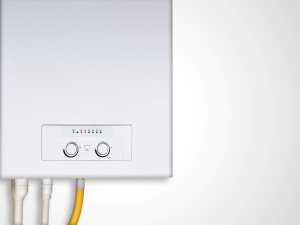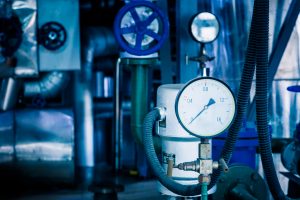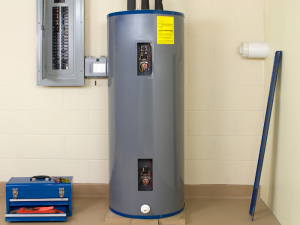Dual element water heating units work precisely like they sound, using two separate elements to even out energy dispersal.
While there are units with single elements, using more than one is surprisingly energy efficient. With one at the top and one at the bottom, the heat spreads out evenly within the unit. This means that when the faucet opens to pour hot water, the fluid is warm and comfortable—not a choice between ice and fire.
In this article, we provide everything you need to know about these appliances.
Dual Element Water Heaters: What They Are & How They Work
As technology develops, there are more and more ways to embrace luxury in the home. This naturally means consumer questions. It’s always best to approach any home improvement with research. Below, find some common questions on the topic and relevant answers that you can use to help make a decision on your home’s water heating unit.
What is a Dual Element Water Heater?
A dual element water heating unit features a large tank, varying in size, with two separate heating elements. There is one at the top and one closer to the bottom. The elements operate electrically independent of one another, meaning the temperature at the top doesn’t necessarily mean the same temperature at the bottom.
Any water boiler that contains two parts that heat is a dual unit. These units are increasingly popular thanks to the efficiency they offer.
How Does a Dual Element Water Heater Work in a Home?
A fun fact about a dual element heater is that both parts never work simultaneously. In fact, they operate more as a failsafe to ensure that there is sufficient heat for times of higher demand. The one towards the bottom pushes the heat upwards using the laws of thermodynamics.
If the bottom water heater is insufficient, for situations like the ongoing flow of water for a lengthy shower, the top element kicks on. It doesn’t work like a circulator pump, but it’s effective if a single boiler attaches to multiple appliances throughout the home.
Are Upper and Lower Water Heater Elements the Same or Are They Different?
The difference between upper and lower water heating elements lies in dry fire. No, it’s not about actually ‘fire’ but rather the jolt that fires through the circuit to activate either of the elements. When a tank gets full, the upper elements turn on initially. This circuit is the primary electrical component and is necessary to communicate with the bottom element.
The lower element doesn’t get triggered until the top of the tank receives heat. Issues with dry-firing occur if the element at the top doesn’t heat, causing the lower element to fail to activate. The system uses two elements as a method of mutual benefit. It’s important to keep both in good condition with regularly scheduled maintenance.
How Many Heating Elements Are in a Water Heater Unit?
Traditionally, there was only one heater in an element. Nowadays, a dual element heater is the standard. The elements refer to the part that heats up through electricity. These parts transfer heat to the water before it gets pumped out into the home. For safety and function, the two heating elements don’t operate concurrently, rather they support each other to limit strain on the unit.
Advantages of Installing a Dual Element Water Heater
There’s a reason so many households made the transition to dual element heaters. They have plenty of advantages, including:
Fast Access to Hot Water
The key is that these appliances provide more rapid access to hot water than their counterparts. Having immediate access to a steamy shower or warm water to wash your hands is more than a convenience; it’s a luxury. There is less chance of running out of water and fewer concerns about running a dishwasher while someone’s in the shower. It’s ideal for any home that multitasks.
Energy and Cost Efficiency Benefits
Another perk of a dual element heater is the energy efficiency that they offer. Yes, it comes with an upfront cost. But it also saves energy and expenses further down the line. New units come with warranties, meaning you don’t have to worry about any issues. Eventually, because the unit saves water and power, it can reduce utility bills sustainably.
Increased Lifespan
In addition to helping out the old pocketbook, dual element heaters are friendlier to the Earth. Anything that requires less energetic input means you shrink your carbon footprint. Finally, another huge benefit is safety. There is less chance of overheating, meaning less risk of electrical issues, waste, and damage from wear and tear.
Downsides of Dual Element Water Heaters
Nothing in this world comes without a downside. When it comes to dual element water heating units, there are a few things to consider. These include:
Cost of Purchasing the Unit
First, purchasing dual element water heaters is more expensive than a single-element model. It likely saves in energy use and convenience, but the upfront cost is higher than a more basic model. Some companies offer pay-as-you-go models or allow for home improvement loans. Other options include saving for the unit or coming to an arrangement with your local plumber.
Large Size of Appliance
Another disadvantage applies to those with limited space. Generally, a dual element water heater requires a fair bit more space than a single-element model. When checking with a plumber or HVAC technician, it’s helpful to have your measurements handy. Determine the depth, width, and height before making any water heater decision.
More Parts Means More Complexity
The final note on potential disadvantages is that when there are more parts, there’s more opportunity for damage. These units are more advanced than the standard single-element model, requiring professional servicing. When used correctly, though, these can last longer and offer a more comfortable experience in the home.
Reach Out to the Experts Today
When it comes to water heaters, there’s no one-size-fits-all solution. The best way to learn about your options is to reach out to the experts. Cloverfield Service takes pride in offering reliable information, quality installation, and honest assessments.
If you’re considering making a change to your water heating paradigm, reach out to our team of professionals at Clover Contracting.




